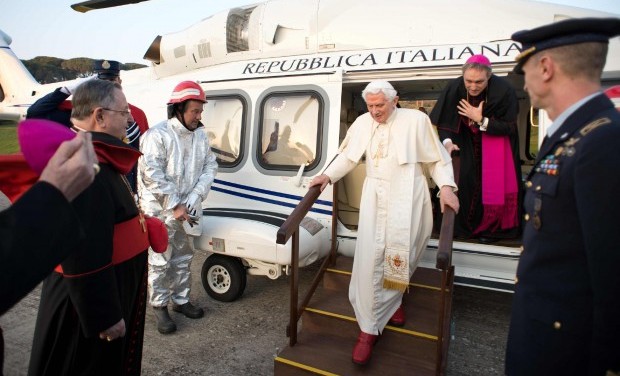
Pope Benedict XVI arrives by helicopter at the papal summer residence at Castelgandolfo, south of Rome, February 28, 2013.(REUTERS/Osservatore Romano)
VATICAN CITY, Reuters—A relaxed and rested Pope Emeritus Benedict read messages from well-wishers and strolled in his retirement palace gardens on Friday as cardinals due to elect his successor planned pre-vote meetings for next week.
The 85-year-old former pope watched televised reports of his departure from the Vatican on Thursday evening, then slept soundly in the papal summer residence Castel Gandolfo, where he will stay for about two months, a Vatican spokesman said.
“He slept very well. The atmosphere was very relaxed and peaceful,” Rev Federico Lombardi told journalists, relating what Benedict’s personal secretary Archbishop Georg Gaenswein had told him by telephone from the palace south of Rome.
Benedict brought compact discs of his favorite music and many books of theology, history and philosophy with him, Lombardi said, and would soon resume playing the piano nightly.
Back at the Vatican, the dean of the College of Cardinals officially invited all eligible “princes of the Church” to assemble in Rome to prepare and carry out the secretive conclave to choose the next leader of the world’s largest church.
Cardinal Angelo Sodano set the first session of the general congregations, the pre-conclave meetings where cardinals discuss future challenges to the Church and discreetly weigh up possible candidates, for Monday morning.
Another session would be held in the afternoon, he announced in what seemed to be an effort to allow as much discussion as possible within a short period. The same talks before the 2005 conclave that elected Benedict were held only in the mornings.
WHEN TO HOLD THE CONCLAVE
The cardinals must decide when to go into the conclave, but cannot do so until all 115 electors from around the world are present. It was not known how many have already arrived.
Nothing is set yet, but the Vatican seems to be aiming for an election by mid-March so the new pope can be installed in office before Palm Sunday on March 24 and lead Holy Week services culminating in Easter the following Sunday.
“Everybody, including myself, wants to have a conclave as soon as possible,” New York Cardinal Timothy Dolan told Reuters. “We miss the pope and we need a new one. And all of us have full-time jobs we want to get back to.”
No front-runner stands out and no campaigning is allowed for the election. A spoof campaign poster for Ghana’s Cardinal Peter Turkson has popped up on walls in Rome still plastered with posters from Italy’s general election last Sunday and Monday.
Apart from Turkson, cardinals mentioned as possible popes include Leonardo Sandri of Argentina, Austrian Christoph Schoenborn, Brazil’s Odilo Scherer, Canadian Marc Ouellet and Angelo Scola, the leading candidate from Italy.
Benedict ended his difficult eight-year reign on Thursday pledging unconditional obedience to whoever succeeds him to lead the world’s 1.2 billion Catholics at one of the most problematic periods in the Church’s 2,000-year history.
When his resignation became official at 8 p.m. (1900 GMT), Swiss Guard sentries outside Castel Gandolfo closed the gates, the papal apartment at the Vatican was locked and Benedict’s papal ring – the symbol of his authority – was destroyed.
SURVEYING THE FIELD
Three U.S. cardinals described for journalists on Thursday evening the various ways they size up potential candidates if no names or policy platforms are announced.
“The discussion we have in the congregations will be most important for the intellectual preparation” for choosing a pope, said Boston’s Cardinal Sean O’Malley, adding the electors were already preparing spiritually for the vote with intense prayer.
He said he had been “using the Internet a lot” to read up on other cardinals.
Cardinal Francis George of Chicago said cardinals had lots of public information already and consulted the other electors to learn more, asking “what do you know about this candidate?” or “what kind of person is he?”
“I would imagine each of us has some kind of list of primary candidates, and others secondary,” he said, adding that those mental lists could change as pre-conclave meetings progressed.
Cardinal Daniel DiNardo of Galveston-Houston said he was reading both about other cardinals and, more widely, about the papacy itself and its significance for the Church.
The cardinals will not see a top secret report prepared for Pope Benedict on mismanagement and infighting in the Curia, the Church’s bureaucracy. But its three cardinal authors will be in the general congregations to advise electors on its findings.
“Since we don’t really know what’s in the report, I think we’ll depend on the cardinals in the congregations to share with us what they think will be valuable for us to know to make the right decision for the future,” O’Malley said.
